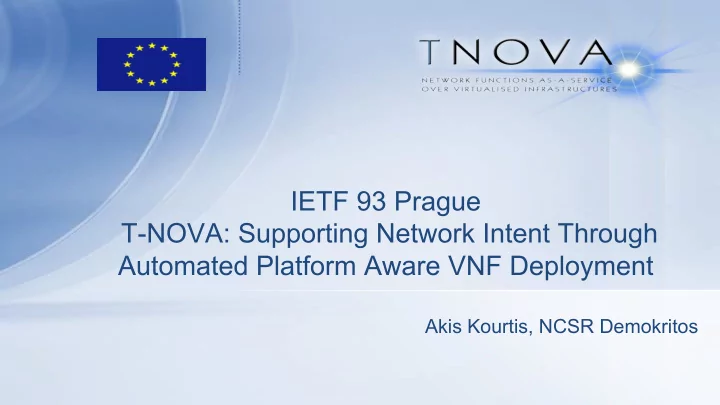

IETF 93 Prague T-NOVA: Supporting Network Intent Through Automated Platform Aware VNF Deployment Akis Kourtis, NCSR Demokritos
Scope • T-NOVA is an EU-funded project, currently half way – NFVaaS – NFV Marketplace • Purpose of this presentation: Tease for an alternative approach on Network-Intent for NFVRG. – Network Intent for NFV is focused on a more SDN approach – What about VNF specific intents? – Resource allocation and Automatic deployment, always in correlation to VNF specific needs. • Enhanced Platform Awareness (EPA) has emerged to enable fine-grained matching of workloads to platform capabilities prior to the deployment of VNFs in a cloud environments.
Problem Statement • Current solution to Automatic VNF deployment: ETSI VNF Descriptor ( VNFD ) – Does not offer a complete VNF <-> VIM connection • The gap needs to be bridged between resource abstraction and platform specific requirements. – Meet Customer Requirements and SLAs . – Providers usually overprovision resources. – Intelligent Resource Mapping is achieved through manual configuration. • Network-Intent mainly describes network behaviors and policies . • Proposal for ‘ Network Performance Intent ’ in the context of supporting VNF deployments in a Telco cloud environment.
T-NOVA EPA Architecture
Proposed Framework • Experimental tests on a virtual Traffic Classifier (vTC) test case. • The collected data is analyzed using a machine learning approach to identify relationships between the types and quantity of resource allocations and VNF performance. • A decision tree is generated which relates specific performance characteristics such as network throughput to various combinations of resource allocations to achieve different levels of performance . • The decision tree can then be encoded for use by an Orchestrator to optimize the allocation of specific resources during automated deployments . • Finally EPA is used to identify the location of a host which has the necessary resources. • Current solution to Automatic VNF deployment: ETSI VNF Descriptor (VNFD)
Workload Data
Machine Learning Algorithm For each sample: • T is the throughput for of the VNF; • N is the number of variables taken into account by the analysis (in this case is 2 because the variables are the vCPUs and the RAM); • w i is a weight assigned to each resource by a service provider (the sum of all w i is equal to 1); • R i is the number of units of resource i allocated in the configuration (this is subject of a min/max normalization with respect the resource with higher value, which in this case is RAM). 7
Decision Tree – Bottom-Up root ¡ Vnic-‑4 ¡= ¡OvS ¡ Vnic-‑4 ¡= ¡SR-‑IOV ¡ Vnic-‑3 ¡= ¡OvS ¡ Vnic-‑3 ¡= ¡SR-‑IOV ¡ Vnic-‑5 ¡= ¡SR-‑IOV ¡ Vnic-‑5 ¡= ¡OvS ¡ 3 ¡Gbps ¡ Less ¡ Vnic-‑1 ¡= ¡OvS ¡ Vnic-‑1 ¡= ¡SR-‑IOV ¡ Vnic-‑3 ¡= ¡OvS ¡ Vnic-‑3 ¡= ¡SR-‑IOV ¡ 400 ¡ less ¡ Less ¡ Mbps ¡ Vnic-‑1 ¡= ¡OvS ¡ Vnic-‑1 ¡= ¡SR-‑IOV ¡ 800 ¡ less ¡ Mbps ¡
EPA Deployment Results
Conclusion • Optimized Deployment achieves same results, but with significant savings on resource allocation . • Machine Learning enhances the automatic deployment of VNFs in complex (SR-IOV, DPDK) environment. – Multiple input types improve the system’s intelligence. • The VNFD is the current industry approach to approach automated deployment: – No account for resource under-utilization – Limitation from an Orchestration Perspective – Does not cover sufficiently EPA issues (SR-IOV, DPDK, etc.) • SFC still remains to be properly addressed and how EPA interferes with it.
Next steps • Comments and feedback are more than welcome! • Propose an Internet-Draft on NFVRG • Further experiments with more technologies. • Aim for a complete automated functional framework ETSI compliant and industry friendly.
Thank You ! Questions ? W: http://www.t-nova.eu E: akiskourtis@iit.demokritos.gr @fp7tnova
Recommend
More recommend